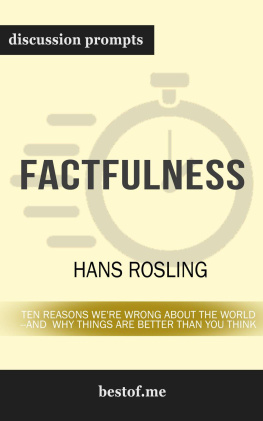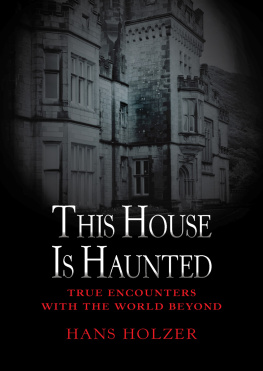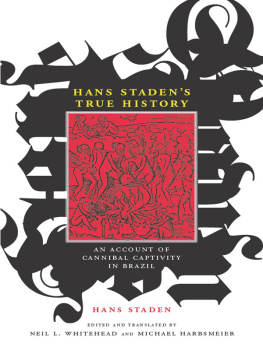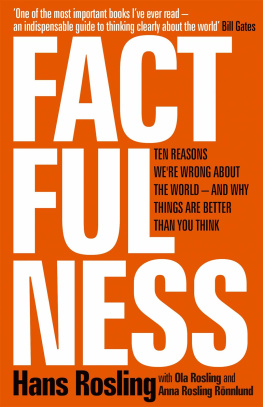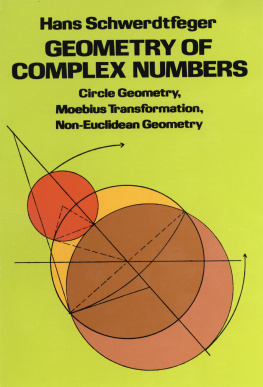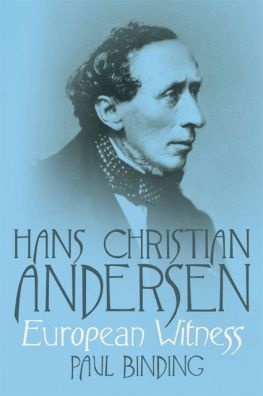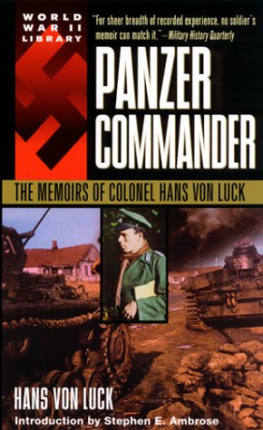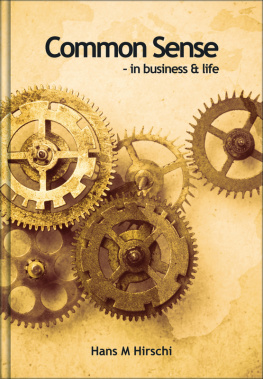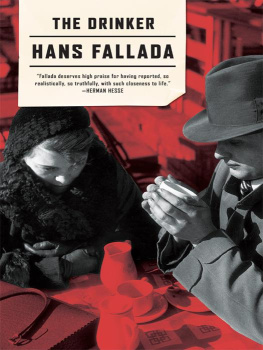Hans Rosling - How I Learned to Understand the World
Here you can read online Hans Rosling - How I Learned to Understand the World full text of the book (entire story) in english for free. Download pdf and epub, get meaning, cover and reviews about this ebook. publisher: Flatiron Books, genre: Non-fiction. Description of the work, (preface) as well as reviews are available. Best literature library LitArk.com created for fans of good reading and offers a wide selection of genres:
Romance novel
Science fiction
Adventure
Detective
Science
History
Home and family
Prose
Art
Politics
Computer
Non-fiction
Religion
Business
Children
Humor
Choose a favorite category and find really read worthwhile books. Enjoy immersion in the world of imagination, feel the emotions of the characters or learn something new for yourself, make an fascinating discovery.

- Book:How I Learned to Understand the World
- Author:
- Publisher:Flatiron Books
- Genre:
- Rating:5 / 5
- Favourites:Add to favourites
- Your mark:
- 100
- 1
- 2
- 3
- 4
- 5
How I Learned to Understand the World: summary, description and annotation
We offer to read an annotation, description, summary or preface (depends on what the author of the book "How I Learned to Understand the World" wrote himself). If you haven't found the necessary information about the book — write in the comments, we will try to find it.
Hans Rosling: author's other books
Who wrote How I Learned to Understand the World? Find out the surname, the name of the author of the book and a list of all author's works by series.
How I Learned to Understand the World — read online for free the complete book (whole text) full work
Below is the text of the book, divided by pages. System saving the place of the last page read, allows you to conveniently read the book "How I Learned to Understand the World" online for free, without having to search again every time where you left off. Put a bookmark, and you can go to the page where you finished reading at any time.
Font size:
Interval:
Bookmark:
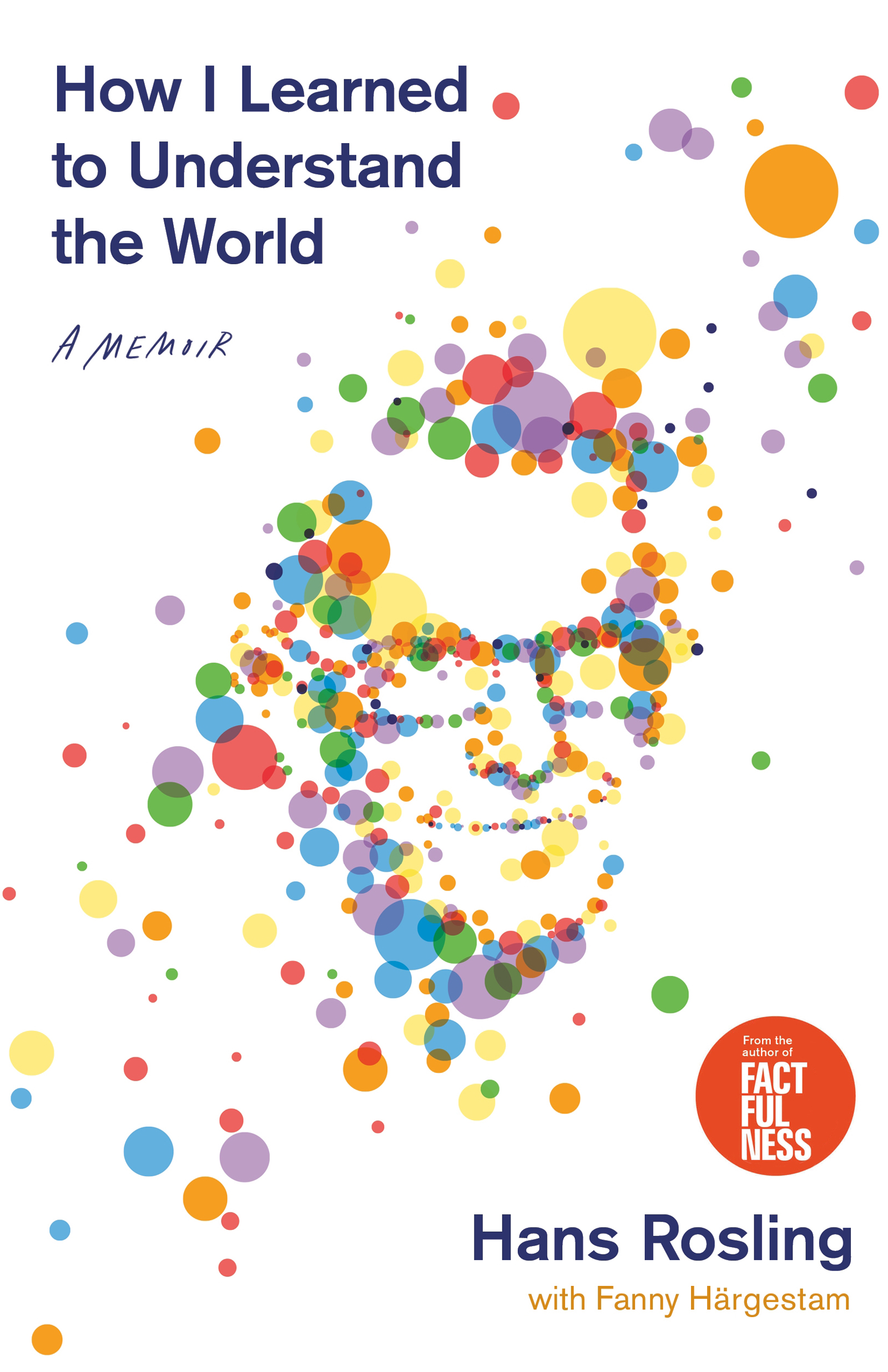

The author and publisher have provided this ebook to you for your personal use only. You may not make this ebook publicly available in any way. Copyright infringement is against the law. If you believe the copy of this ebook you are reading infringes on the authors copyright, please notify the publisher at:
us.macmillanusa.com/piracy.
by Agneta Rosling
After more than fifty years of friendship and marriage, three children and eight grandchildren, Hans left me to a severe silence. Through this book his voice can be heard again.
Hans started writing about his life several years ago. He wanted to use his own family experience to tell the story of social development: to point out the similarities between the lives of people from his grandparents generation, born in Sweden over one hundred years ago, and the lives of people in many countries today, far away from modern-day Sweden both in kilometers and in their living conditions. He wanted to share the stories that had changed or strengthened his vision of what was important in life: of what has to be changed in the world to give us all a sustainable future.
Hans always emphasized that he wasnt being altruistic when he emphasized the need for equality to avoid conflict and war, but selfish. He wanted a world without war for himself, his family and everyone else. Neither was he an optimist, because he never thought the changes he was talking about would be easy to achieve. He called himself a possibilist and always strived to convince his audience that it was possible to make the world a place where everyone had a fair chance of living a life on reasonable terms.
Cross-country running was a favorite sport, and Hans always liked to use a map to know where he was and a compass to find the way. This illustrates his way of analyzing any situation. You can find the right direction and reach your goal only if you know where you are now and how things are around you. The importance of developing critical thinking habits to understand global development is covered in greater depth in the book Hans wrote with our son Ola Rosling and daughter-in-law Anna Rosling Rnnlund, Factfulness.
This book, How I Learned to Understand the World, tells Hanss own story, from childhood through to his adult life and career. It was first published in Swedish the year Hans passed away. In this edition, some of the stories are left out, as we thought these would only be interesting in the Swedish context or because they had already been told in Factfulness. I am very pleased that English-language readers will be able to read Hanss memoir in this edited form.
Hanss legacy is maintained and developed by the Gapminder Foundation and, in various ways, by a number of universities both in Sweden and elsewhere. Through the Gapminder Foundation, Ola and Anna are continuing their creative work of promoting a fact-based worldview that is easy to understand. At this time, with the Covid-19 pandemic threatening to increase poverty and hunger in many low-income countries, Hans would have been more committed than ever to this work. I am satisfied to know that his voice is still being heard, and that so many people have learned the lessons he was trying to teach and taken his experience to heart.
Hans would have loved to test your knowledge.
The importance of a fact-based understanding of the world is more pressing than ever.
Agneta Rosling
Uppsala, April 2020
On February 5, 2016, I spoke to my doctor on the phone. What he said meant that writing this book became a priority. I had been prepared for bad news, and it was. The diagnosis was pancreatic cancer.
Our talk that Friday afternoon only confirmed what had gradually become obvious to me during the last few days of undergoing medical investigations. The prognosis was bad. I had approximately one year left to live.
I spent most of that evening in tears. I was lucky to have Agneta, my wife, who had been my lovely young girlfriend and then became my partner for life when we got married in 1972. Through the comfort she offered me and the support of our children and friends, I was able to adjust to this new reality. I would not die in the coming month. Terminal illness or not, life would go on. And I would be around to enjoy life during the spring and summer at least.
Cancer made the structure of my daily life unpredictable and my work schedule had to change. Just a few days after learning of my illness, I canceled all my lecture engagements and also my participation in film and TV projects. It was sad but I had no choice. Besides, I had specific plans, which helped me cope with these dramatic measures. One item on my to-do list moved to the top: complete the book that I had planned to write jointly with my son, Ola, and his wife, Anna. We had agreed on the title: Factfulness. Over the last eighteen years, the three of us had been working together in public education and founded a not-for-profit venture called Gapminder.
In the autumn of 2015, Anna and Ola had formulated the concept behind the book as well as its title. We had decided to set aside the following year for writing it, in parallel with our work for Gapminder. After my cancer diagnosis I was in even more of a hurry.
I quickly realized that there was enough material for two books. While Factfulness is about the reasons why people find development on a global scale so hard to grasp, this book is about me and how I reached that understanding.
In other words, this is a memoir. Unlike Factfulness, it is very short on numbers. Instead, I tell stories about meeting people who opened my eyes, and made me step back and think again.
Hans Rosling
Uppsala, January 2017
When my father came home from work in the evening, he always smelled of coffee. He worked in the roasting shed at Lindvalls Kaffe in Uppsala. This is how I came to love the scent of coffee long before I began to drink it. I often watched out for Pappa coming home from work, waiting outside as he cycled along the street. He would jump off his bike and hug me and then Id ask him the same question every time: Did you find anything today?
When the sacks of green coffee beans arrived for roasting, the beans were tipped out onto a conveyor belt and, first of all, screened by a powerful magnet. The idea was to remove any metal objects that might have ended up in the sack during the drying and packing process. Pappa would bring these things home to me and tell me a story about every one of them. These stories were thrilling.
Sometimes he brought a coin. Look, this is from Brazil, he might say. Brazil produces more coffee than anywhere else.
My father would let me sit on his lap, open the world atlas in front of us and begin telling the story: Its a large country and very hot. This coin turned up inside a sack from Santos, he would explain, pointing at the Brazilian port city.
He would describe the working men and women, links in the chain that ended with people in Sweden sipping their coffee. Early on, I realized the coffee pickers got the poorest pay.
Or it might be a coin from Guatemala. In Guatemala, white Europeans own the coffee plantations. The locals, who were the first to settle in the country, only get the low-paid jobs. Like picking coffee berries.
Font size:
Interval:
Bookmark:
Similar books «How I Learned to Understand the World»
Look at similar books to How I Learned to Understand the World. We have selected literature similar in name and meaning in the hope of providing readers with more options to find new, interesting, not yet read works.
Discussion, reviews of the book How I Learned to Understand the World and just readers' own opinions. Leave your comments, write what you think about the work, its meaning or the main characters. Specify what exactly you liked and what you didn't like, and why you think so.

